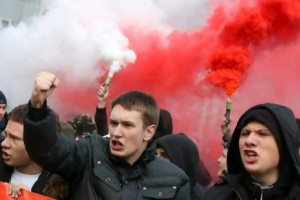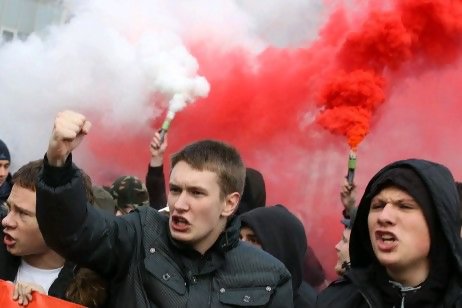By Anna Malpas

Moscow (AFP) – Several thousand Russian ultra-nationalists whose ranks included fierce Kremlin critics marched through central Moscow on Sunday calling for President Vladimir Putin’s resignation and an end to illegal immigration.
Armed with anti-Putin slogans and black and yellow flags of pre-revolutionary Russia, the black-clad participants in the “Russian March” took to the streets as Putin is facing the most vocal opposition to his rule since he came to power 12 years ago.
The march is timed to coincide with the Day of Popular Unity, a national holiday which this year marks the 400th anniversary of the 1612 expulsion of Polish occupiers from the Kremlin.
“We are the authorities, the authorities are us,” some participants shouted.
“Putin’s clique to trial,” shouted others. “We beat Hitler, we will beat Putin.”
The Russian president has been facing a nascent protest movement against his rule since an election that returned him to the Kremlin for a third term in May and the anti-Putin cause has become popular with ultra-nationalists.
Many observers fear Russia may plunge into chaos if nationalist forces come to power, and some have accused Alexei Navalny, arguably the most charismatic leader of the anti-Putin movement, of openly flirting with ultra-nationalism.
Alexander Belov, one of the march’s organisers, said the participants were growing disillusioned with Putin.
“Putin is the head of the criminal regime,” Belov told reporters. “They are tired of him.”
He accused Putin of neglecting the rights of the country’s Slavic population and turning a blind eye to illegal immigration.
“The best people right now are forced to leave for the west,” he said.
Nazi insignia are not allowed during the annual march, said Belov, estimating the turnout at around 20,000.
Moscow police put the number of participants at 5,800 to 6,000.
They detained 25 people wearing black military overcoats in the city centre. Many participants in the march covered their faces with scarves and surgical masks, defying a new law banning masks during rallies.
Rights activists warn that xenophobia is on the rise and more and more Russians sympathise with the nationalist cause.
Many Muscovites complain of a heavy influx of poorly educated migrants from impoverished ex-Soviet central Asia, saying the affluent capital is now bursting at the seams.
“I am against the lack of a visa regime with central Asian countries,” said Andrei Goldin, a 38-year-old university teacher.
“I am against the preferential financing of Caucasus regions at the expense of Russian regions.”
Putin has slammed attempts to inflame nationalist sentiments, evoking the country’s multi-ethnic, multi-confessional history.
The authorities have allowed the nationalists to march through the capital despite pleas from the Federation of Migrants of Russia to either cancel or postpone the event.
The federation argued the march could sow discord in the multi-ethnic capital, especially on a day meant to promote unity.
It is the first time in several years that the authorities have allowed the march to take place in central Moscow instead of its fringes.
Smaller nationalist rallies were held in several big cities across the country.
In remarks that were widely seen as a veiled attack on the opposition, Russian Orthodox Patriarch Kirill urged Russians on Saturday to steer clear of political turmoil that he said could result in a new Time of Troubles, a period in the late 16th and 17th centuries marked by rebellion against authority and attempts to seize power with foreign help.
In a video message targeting schoolchildren, Russian parliament speaker Sergei Naryshkin also spoke about that period, appearing to draw parallels with the present.


